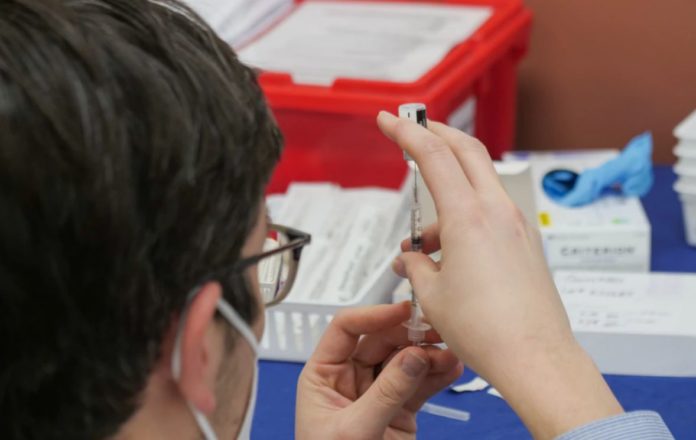The controversy of AstraZeneca and the EU begins to negatively affect the image of the Oxford vaccine
AstraZeneca is back on time. The Anglo-Swedish pharmaceutical company has just communicated to the European Union that it will deliver less than half of the Covid-19 vaccines that were agreed for the second quarter. A delay that adds up to the one already announced for the first quarter and which led to the “vaccine crisis” a few weeks ago.
- Does This Mean We Stopped Being Animal and Started Being Human Due to ‘Copy Paste’ Errors?
- The One Lifestyle Choice That Could Reduce Your Heart Disease Risk By More Than 22%
- Aging: This Is What Happens Inside Your Body Right After Exercise
- Immune-Boosting Drink that Mimics Fasting to Reduce Fat – Scientists ‘Were Surprised’ By New Findings
- Gun Violence in America: What They Don’t Talk About at the Debate
This has raised concerns that the EU target of vaccinating 70% of the population by summer will be compromised; However, as vaccines like Johnson & Johnson, Curevac, or Novavax approach approval, that fear seems unfounded. What is interesting about AstraZeneca is beginning to be something else: a clear example of how social, political, and media reactions to a vaccine can end up blowing up public confidence in it.
And, in many parts of Europe, confidence in the Oxford vaccine has plummeted without any solid reasons behind it.
What about AstraZeneca?
The most visible case is Germany. Across the country, according to data from the Robert Koch Institute, only 87,000 of the 736,800 doses of AstraZeneca vaccine delivered to date have been used. In Spain, to get an idea, 141,258 of the 418,000 it received have been posted.
This is partly explained by the characteristics of vaccination with AstraZeneca: restricted to people under 65, efforts tend to focus on the most vulnerable layers of the population. However, this does not account for the whole problem. A few days ago, the German public radio, Deutsche Welle, published a report warning that the AZ vaccine was still very unpopular.
According to the report, among health personnel, it had become common to reject the vaccine on the grounds that it was ineffective or even unsafe for new strains. Although it is always difficult to establish a direct relationship, this seems to indicate that it is a direct reflection of the controversy of recent months. It should not be forgotten that it was precisely the German press that published the false exclusive that the efficacy of the vaccine was 8% in those over 65 years of age and that the news about the “paralysis” of this same vaccine in South Africa has enjoyed a lot of echo in the country.
The birth of a ‘Black Legend’
However, the reality is that AstraZeneca’s “black legend” has gone far beyond the data allow. In Germany itself, numerous experts such as the virologist Christian Drosten or the immunologist Carsten Watzl have denounced the misinformation.
- Does This Mean We Stopped Being Animal and Started Being Human Due to ‘Copy Paste’ Errors?
- The One Lifestyle Choice That Could Reduce Your Heart Disease Risk By More Than 22%
- Aging: This Is What Happens Inside Your Body Right After Exercise
- Immune-Boosting Drink that Mimics Fasting to Reduce Fat – Scientists ‘Were Surprised’ By New Findings
- Gun Violence in America: What They Don’t Talk About at the Debate
As we have explained on several occasions, the efficacy figures we manage depend on clinical trials, and comparing them is an almost impossible task. In fact, what we are finding in some preliminary data is that with a good design of the vaccination campaign the results of AstraZeneca may be better than those of mRNA vaccines.
It is clear that social reluctance is reasonable. For months, we have reflected on the difficulty of sustaining at the same time that we had obtained vaccines very quickly and that it was perfectly safe. However, the data speaks for itself: 200 million vaccines have already been given, the safety and efficiency data are becoming overwhelming, and, fortunately, skepticism is increasingly difficult to sustain.
History of an announced crisis
The most interesting thing about all this is that we cannot say that it is a surprise. In October 2013, when one of the world’s great medical journals, the BMJ, published a couple of studies that suggested that the side effects of statins (an anti-cholesterol drug) could outweigh the benefits. After months of underground debate, fear erupted in March 2014 with headlines such as “Why I’ve ditched statins for good” (The Daily Telegraph).
The funny thing is that, although most of the media published the studies with reservations “Doctors’ fears over statins may cost lives, says top medical researcher”, said ‘The Guardian’; “Statins do NOT have major side effects”, headlined Daily Mail, the effects of the controversy were dramatic: between 11-12% of people who took statin (and needed it) stopped taking it as a result of it.
During these months of the pandemic, we are learning a lot about how health attitudes, political measures, and media controversies interact. What we have seen is new is in this type of mechanism that turns trust into a “non-renewable resource”; something that is difficult to build, but dissolves quickly and creates huge social problems afterward.
